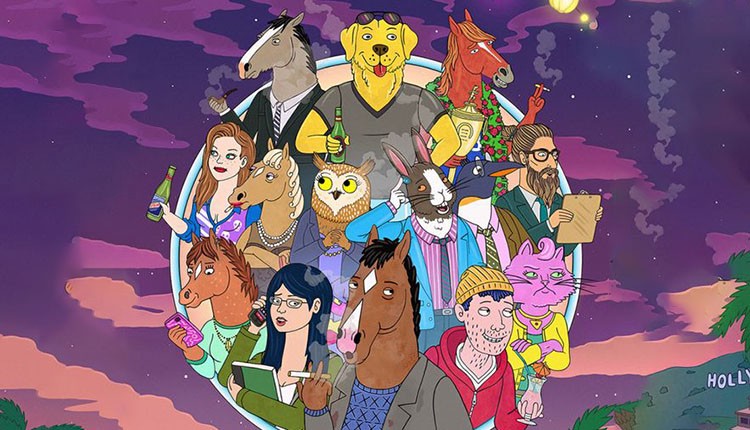Netflix’s “Bojack Horseman” is one of the most critically acclaimed animated series in recent years. The show has won 34 awards for various categories. Aside from all these awards, the show has been credited for accurately portraying mental illness, struggles with addiction, social anxiety and a whole bevy of real-world problems. All in a universe populated by anthropomorphized animals and littered with animal-related puns. Hey, its not hard science fiction.
There are many exhaustive analyses of the titular horse, troubled writer Diane Nguyen and even manifestos on the asexual Todd Chavez. But comparatively few people deep-dive into Mr. Peanutbutter, Bojack’s long-time rival and colleague. Is this fun-loving Labrador really as simple as he appears?
Learn why Mr. Peanutbutter isn’t as uncomplicated as you would initially believe.
Who is Mr. Peanutbutter?

Mr. Peanutbutter is initially portrayed as a goofy, fun-loving bro-type Labrador. He rose to fame starring in a show that ripped off Bojack Horseman’s “Horsing Around” and was famously married multiple times, once to Jessica Biel.
He’s not the brightest bulb around, once driving himself to bankruptcy by investing in ludicrous schemes. His main traits are his never-ending positive energy and charisma. Mr.Peanutbutter’s voice, provided by Paul F. Tompkins, rarely changes in pitch or tone. He nearly always sounds eager and supportive.
Over the course of the show, you get to see glimpses that Mr. Peanutbutter isn’t as clean-cut or simple as first established.
In season one, the supposedly stupid Labrador quickly claims Bojack’s stunt of stealing the D from the Hollywood sign. In season 2, he shows real worry and concern about Diane’s well-being after her expose on a beloved celebrity’s sexual misconduct ends with her getting death threats. Season three showcases that even Mr. Peanutbutter is cracking from the strain of his marriage to Diane Nguyen. He’s even tried his chops at running for governor in the next season, an act which ultimately splits him and Diane apart.
The fourth season is perhaps one of the best times the show used its silly premises to great effect, showcasing how damaging some of Mr. Peanutbutter’s actions are to his relationship with Diane. His tendency to let people walk all over him almost led to him becoming a puppet governor. His rash decision making led to their house being swallowed by the ground thanks to fracking.
Clearly, Mr. Peanutbutter has deeper levels, just like all the other members of the “Bojack Horseman” cast. But why is he as important a character as Bojack himself?
Why is Mr. Peanutbutter Important?

The importance of the character is foreshadowed by the show’s opening sequence, where Mr. Peanutbutter and Diane look down in alarm at a drowning Bojack. Aside from story-related importance, the character is also essential in building up the themes of the show.
-
Foil to Bojack
Bojack and Mr. Peanutbutter exist as two sides of the same coin. They’re only a few years apart in age, but whereas Bojack has let himself go and has a noticeable paunch, Mr. Peanutbutter is very fit. Bojack tends to wear dressed down attire and the younger actor is casually cool. Bojack is a source of endless cynicism and bitterness, but Mr. Peanutbutter just gushes out positivity. Bojack let himself be trapped by his legacy whereas his rival rarely lets himself be tied to any project for long. Bojack himself is aware of these differences, and it’s a source of pain for him because the Labrador represents what he could be if it weren’t for all his problems.
-
Comedic Relief
“Bojack Horseman” has some very dark and depressing moments, but in the end, it has an upbeat message and is still very much a comedy. Although everyone on the main cast contributes to the comedy at one point every episode, the pure gags nearly always fall on Mr. Peanubutter or Todd Chavez. His jokes and sunny disposition make him not unlike a lot of the members of the “Bob’s Burgers” cast. His value as comedic relief helps highlight the darker moments of the show and also make episodes more palatable. Mr. Peanutbutter’s quotes are just full of pep and zingy one-liners that make the show a little brighter when needed.
-
Deconstructs Tropes
Finally, Mr. Peanutbutter is a deconstruction as well, much like every other character on the show. In this case, he is the Nice Guy. In recent years, the Nice Guy has been analyzed and deconstructed by numerous media. Characters like Homelander and most of the men in “Promising Young Woman” all fall neatly in the supposed Nice Guy trope. These are men who are friendly, charming and maybe even silly. They’re quirky and upbeat, but they often hide dark undercurrents. For Mr. Peanutbutter, its his immaturity and his refusal to listen to his partner’s needs.
Is Mr. Peanutbutter a Problematic Character?

So is Mr. Peanutbutter a problematic character? Yes, he is.
The show makes no secret of the fact that his endless enthusiasm and stubbornness, although wrapped in positivity and niceness, can be very grating. This is showcased the best during the last legs of Mr. Peanutbutter and Diane’s marriage, when he keeps insisting on grand gestures that she has repeatedly told him not to do.
Among all the characters in the show, he is perhaps the only one not to have had sweeping character growth, ending the show just as he started it. This perfectly encapsulates the problematic Nice Guys in fiction and media Mr. Peanutbutter represents.





